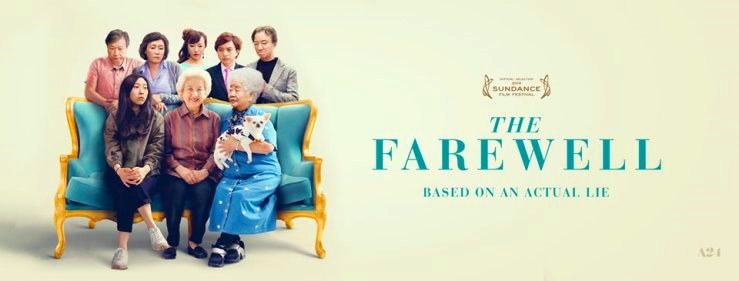
About 80 minutes into the deftly and emotionally supple 98-minute total of The Farewell, a major character darts out of a major family function and is seen running through the streets. It appears that said character is having a freak-out, that cliché of a character unable to handle the emotional family duress and needs remove and air. I can hardly believe hard running can take place after consuming so much family served alcohol. I’ve long tired of that running away from it all cliché, and for a moment, it felt like the first major misstep in what was a smoothly told, fine film. But no. That character has simply just thought of something to help, something that nobody else in the family had thought of. The character is in intercept mode. I got thrown for a loop.
Everything you’ve heard about the remarkable Awkwafina is true, she is very much awkward, clumsy, and naturally funny, yet existentially attuned to what this drama is conveying. As Billi, a young New York woman who is a little shabby despite coming from a family with reliable wealth, gets wind of news that her beloved grandmother Nai Nai has been diagnosed with terminal cancer and has three months to live, and therefore, gets on a plane immediately after her parents already have to make an unannounced drop to her homeland country that she hasn’t been to in over twenty years. The excuse is that she came to attend a wedding of a cousin, even though that cousin isn’t somebody she knows well or cares much about.
Nai Nai has been described as a perfect mother, a perfect grandmother by all those close to her. It takes mere moments to see that as truth: Nai Nai is played with heartiness and dauntless spirit by Zhao Shuzhen, in what is easily one of the year’s greatest performances. Her bones may be rickety, the cough pesky, but she is unflappable. The bona fide driving force of the family, and not for a moment do we not see that and feel that.
The pensive hook of the story is wrapped around Chinese tradition in how they treat death different than Americans, that all terminal disease news should be hid away from the beloved. Billi is of the opposite mind of that and thinks her grandmother should know she’s terminal so she can prepare to say her proper goodbyes. However, Billi concedes to those wishes of her relatives for as long as she can. The film opens with a title message, “Based on an Actual Lie,” and since this personal film is by Lulu Wang we are to believe everything that happens in it had happened to her family. The poignancy is at all times graspable.
By the way, Wang has incredible natural instincts for a filmmaker – she seems to know exactly where to put the camera, either close to bring us into the family intimacy or subjectively distanced to reveal something particular about her culture, in every shot of the film.
Mandarin film with English subtitles.
98 Minutes. Rated PG
FOREIGN DRAMA / PROVOCATION / FOOD FOR THOUGHT
Film Cousins: “The Wedding Banquet” (1993, Taiwan); “The Way Home” (2002, South Korea); “Still Walking” (2008, Japan); “Like Father, Like Son” (2013, Japan).





